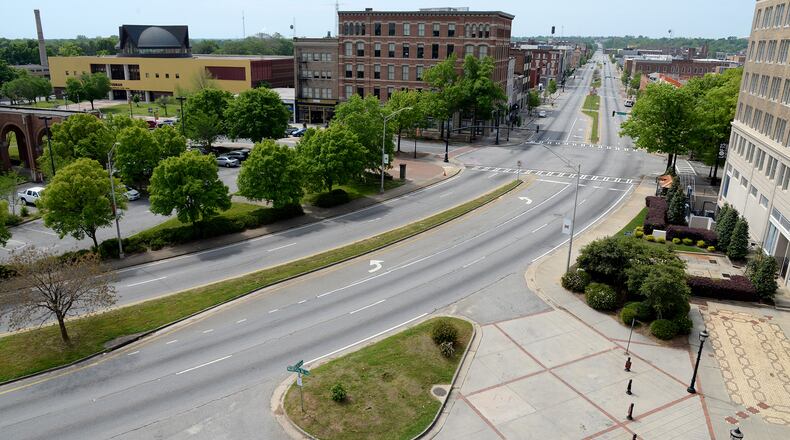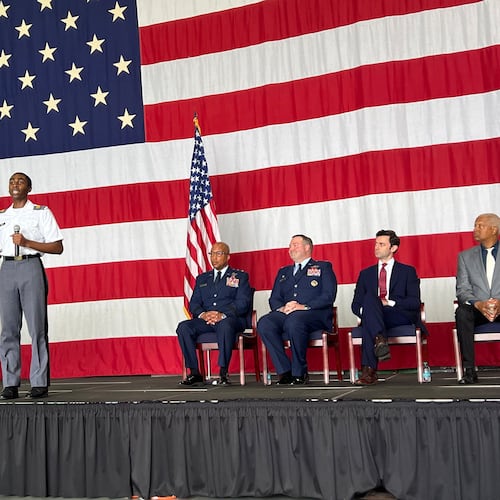MACON-- Macon is 75 miles south of Atlanta, but really it’s a world away.
Residents in the city of about 154,000 have their own downtown, their own schools and business, and, unfortunately, their own struggle with a spike in violent crime.
Like Atlanta, the number of criminal homicides in Macon nearly doubled in 2020 and has remained at the same increased pace in 2021.
But unlike Atlanta, the mayor and the local leaders there are working away from the national spotlight and the political pressures driving the debate on policing and crime.
The result in Macon is an unfamiliar blend of pro-police, pro-community, and pro-anything-else- that-might-work ideas, all to solve the problem that everyone wants to go away.
The man at the helm of the consolidated Macon-Bibb County government is the new mayor, Lester Miller, elected at the end of the pandemic.
Miller is white, while the city of Macon and larger Bibb County are both majority Black.
He was born in Macon and attended seven different Bibb County elementary schools in seven years, moving again and again with his parents who both worked two jobs, but still struggled to afford the basics.
“My mom and I literally sat down and rolled the change she had from tips to pay our bills,” he said during an interview in his office at City Hall. “It gave me an appreciation for people who didn’t make a lot of money.”
He was the first in his family to graduate high school, going on to law school and work as a lawyer and small businessman. After two terms on the school board, he campaigned for mayor on a pledge to put more police on the streets.
“During the campaign, we asked people, ‘What’s one of the top issues in Macon-Bibb County?’ They’d say, ‘Public safety,” he said. “It’s not all about putting boots on the ground, it’s community-oriented as well. But that’s usually the first thing they’d say.”
True to his campaign promise, Miller’s first budget increased money for the sheriff’s department to give pay raises and improve the county jail.
But focusing on crime for Miller also meant focusing on the people who live with it, especially among the 25% of residents living in poverty.
Over the winter, the mayor and the nine-member, non-partisan board of commissioners moved to open no-cost mental health clinics in low-income neighborhoods, along with a temporary homeless shelter.
“The issues are all tied together,” Miller said. “If you draw a circle around the area where we put the clinics, they are also the most blighted, the least educated, the most impoverished, with food deserts, high crime or gun violence. So they work in the same cycle.”
While most mayors and city commissions struggle to find money to cover the bare minimum, Macon-Bibb County is slated to receive $75 million from the American Rescue Plan, the $1,9 trillion stimulus bill Democrats passed through Congress earlier this year.
It’s a once-in-a-generation opportunity to do more than the bare minimum. Much more. On Tuesday night, Miller and the commission decided to focus nearly all of the first $18 million on crime or improving neighborhoods where crime is most pervasive.
First, they voted to make the temporary homeless shelter permanent. They also funded a $2 million violence prevention program, allocated $5 million to clear out some of the city’s 2,000 blighted properties, and additional money to attract grocery stores with fresh produce back to low-income neighborhoods to act as anchor businesses.
After two months of listening sessions with the community, they’ll have a strategic plan to continue to deal with crime for the next three years, which Miller said will be partially “sheriff -led” and partially “community-led.”
Talking to Miller, it’s hard to tell if he’s a Democrat or a Republican. When I told him that, he responded, “I’m not.”
“I avoid that subject because really I can’t change things at the national level. I can only control what I can in Macon-Bibb County as the mayor and we’re going to do right by people regardless of partisan politics.”
While the commission is technically non-partisan, it’s politically split and racially split.
But the mayor pro-tem, Seth Clark, a Democrat, said that just like Miller, he heard from voters in his historically Black neighborhood of Pleasant Hill that tackling crime was also crucial to them.
“People care about the quality of life outside their front door,” he said. “The violence in this community is real, like it is in every city our size around the country. We’re experiencing what I believe is a public health crisis.”
But he said he also sees wrap-around services like dealing with blight and filling in food deserts as an essential part of that, too.
Commissioner Raymond Wilder represents the conservative, rural portion of Bibb County. He supports the focus on mental health along with fully funding the sheriff’s department.
“I make no bones about the fact that I’m a conservative,” he said. “I feel like we all are looking more at our common goals. I mean, is it gonna be perfect? No. But I feel very positive about where were are going.”
As positive as all of this sounds, it’s always easier to spend money than cut programs. And the first six months of an administration hardly give anyone time to get double-crossed or dirty-tricked like always seems to happen in politics, no matter the size of the city.
But the very fact that Macon has come up with ideas, funded them, and done it with mostly unanimous agreement is something to see.
Before Seth Clark was a Macon elected official, he worked for Democrats in Atlanta from John Lewis to Michelle Nunn to Jason Carter. He did high-level campaigns and fought high-profile fights. He likes this better.
“Having worked in state and national politics, I’ve never seen a spirit of cooperation be as successful as it is locally right now,” he said. “I don’t know if it’s a honeymoon period. I don’t care. It feels really good.”
This article is the second installment of the AJC’s Georgia Politics Road Trip series, reporting from the road on the politics throughout the state.
About the Author
Keep Reading
The Latest
Featured



